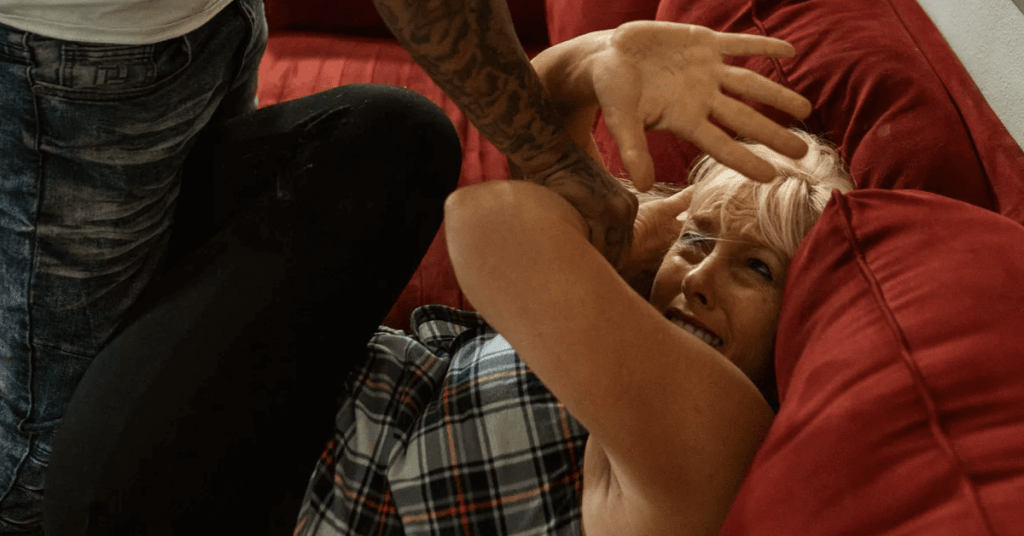An AVO is usually requested by someone who thinks they are at risk of violence or abuse from another person.
If you’re experiencing abuse, it’s understandable to feel frightened, but gaining a clear understanding of what an AVO entails and its conditions can empower you to take control of your situation. By delving into the details of AVOs, you can equip yourself with the knowledge and resources needed to make informed decisions and pave the way toward a safer and more secure future.
Table of Contents
ToggleWhat is an AVO?
An AVO is an Apprehended Violence Order which is a court order in Australia to protect a person or group of people from violence, harassment, intimidation, or other forms of threatening behavior.
An AVO is usually requested by someone who thinks they are at risk of violence or abuse from another person.
The order can stop the person who is the subject of the order from coming near or contacting the protected person(s) or behaving negatively towards them.
Two types of AVO are the Apprehended Domestic Violence Order (ADVO) and the Apprehended Personal Violence Order (APVO).
Key Takeaways:
- An Apprehended Violence Order (AVO) is a legal document issued by a court in Australia to protect a person or group of people from violence, harassment, intimidation, or other forms of threatening behaviour
- A person can defend themselves against an AVO and offer evidence to the court to disprove the allegations against them.
- An Apprehended Violence Order (AVO) application may be withdrawn by the individual who filed it before or during the court hearing.
- When served with an AVO, it is crucial to understand the conditions as they define the permissible and prohibited actions. AVO conditions consist of two types: mandatory orders and additional orders.
What is an AVO for a Defendant?
When considering an AVO from the defendant’s perspective, its gravity lies in the nature of their offences and the potentially life-altering consequences that may follow.
The implications of an AVO extend beyond personal matters, affecting professional connections and curtailing the freedom to engage in certain activities or travel freely.
Defendants are often compelled to comply with specific conditions, such as refraining from contacting the protected person, avoiding their residence or workplace, and refraining from any form of threat or intimidation.
Violating the terms of an AVO can result in criminal prosecution, penalties, and, in severe cases, imprisonment.
It is important to know that a person can defend themselves against an AVO and offer evidence to the court to disprove the allegations against them. Also, they might seek legal representation to learn about their rights and options.
Can an AVO Application be Withdrawn?
Yes, an Apprehended Violence Order (AVO) application may be withdrawn by the applicant who filed it before or during the court hearing.
If the applicant no longer believes they are at risk of violence or abuse or have settled their differences with the AVO subject, they may withdraw their application.
It is important to remember that even if the AVO application is withdrawn, the defendant may still be required to appear in court and respond to the allegations brought against them.
If the court has previously issued a temporary or permanent order, it will remain in effect until the court decides to revoke it.
Also, note that drawing back an AVO application doesn’t stop the police from acting if they think a crime has been committed, like assault or stalking. The police could still look into the situation and charge the person who was the subject of the AVO if they have evidence to back up the claims.
What You Need to Know About AVO Conditions
When served with an AVO, understanding the conditions becomes crucial, as they outline what you can and cannot do. AVO conditions encompass two types.
AVO Conditions in Mandatory Orders
Every AVO, following Section 36 of the Crimes (Domestic and Personal Violence) Act 2007 No 80, must include the following mandatory orders, which appear as Order 1:
- Any person having a domestic relationship with the protected person must not be assaulted or threatened.
- Intentional stalking, harassment, or intimidation of the protected person or any other person having a domestic relationship with them is prohibited.
- Any property belonging to or in possession of the protected person or another person having a domestic relationship with the protected person must not be destroyed or damaged recklessly.
The orders provide a minimum level of protection. As they do not prevent contact or exclude the protected person from the premises, they can be made even if the defendant and the protected person are still living together or in a relationship.

AVO Conditions in Additional Orders
To ensure the safety and protection of a PINOP and their child or other family members, a court may impose any restriction or prohibition on a defendant that appears to be ‘necessary or desirable’.
Section 35 of the Crimes (Domestic and Personal Violence) Act 2007 No 80 sets out additional orders that can be included on an AVO without limiting a court’s prohibitions or restrictions.
The law regarding AVO orders and how they were written changed on 3 December 2016.
AVOs made before 3 December 2016 could also include the following additional orders:
Contact Orders
- If the defendant lives in a property where the protected person(s) may reside from time to time, or if he or she lives in another specified location, the defendant must not reside there. In other words, you cannot live with a protected person.
- The protected person must not be approached or contacted unless the contact is through a lawyer. Only your AVO lawyer can approach the protected person or communicate with them by phone, text message, email, writing, through a third party, or in any other way.
- You must not approach the school or any other place the protected person might go to for study, any place they might go to for childcare, or any other place listed in the application.
- Following alcohol or illicit drug use, you must not approach or be in the company of the protected person for at least 12 hours.
- Trying to find the protected person is illegal unless a court has ordered you to do so.
AVO Conditions about Family Law and Parenting Orders
Unless your lawyer recommends counseling, mediation, or conciliation, or as ordered by the court or as agreed with the other party, you may not contact or approach the protected person by phone, text message, email, writing, through a third party, or any other method.
AVO Conditions About Locations
- Living with the protected person or in a place specified in the order is prohibited. This order can be made regardless of whether you own or lease the property.
- Protected persons cannot be visited at home, work, or another address (if specified).
- You must stay a certain distance from the protected person’s home, work, or another address (if set).
AVO Condition about Weapons
You are not allowed to possess any firearms or prohibited weapons.
Need an Experienced AVO Lawyer to Guide You
At Justice Family Lawyers, we understand AVO’s complexity and are committed to providing our clients with the highest quality legal advice and representation.
Our AVO lawyers and practitioners are highly experienced and knowledgeable in family law matters, and we are committed to helping our clients receive the best possible outcome.
Principal of Justice Family Lawyers, Hayder specialises in complex parenting and property family law matters. He is based in Sydney and holds a Bachelor of Law and Bachelor of Communications from UTS.







24 thoughts on “Crucial Knowledge: AVOs and Their Conditions Uncovered”
my 19 yr epileptic grandson lives in WA and his mother threw him out when moved in with new male. He of course yelled & abused her so she took out an avo but now he’s had his new phone, wallet, ID, Debit card & jacket & cap stolen and is afraid to report it to police bcos of avo !!
What are his choices ?
Hi Cheryl. Just because your grandson has an AVO on him, it does not mean he cannot contact the police if his belongings have been stolen. He is still able to contact them and report the missing items.
HI , just a question. My son was served an AVO a few years back. Now he has told us (the grandparents) that family is not allowed to go near the child.. my question is if the family is on the AVO shouldn’t they be served with an AVO also???????
Thank you 🙂
Hi
If you are a defendant on an AVO, you should be served with a copy of the avo, otherwise you would have no notice of it.
Hey mate,
Car’s registered under Defendant’s name, but on Plaintiff’s property. Defendant doesn’t want the car. Plaintiff also doesn’t want the car – just wants it off their property.
Can an unbiased 3rd party do all the communication directly to the Defendant, and organise the transfer documentation between seller [D] & buyer [3rd party]? (Plaintiff okay for car to be registered under 3rd party, in order to get rid of it off their property).
Would this be considered as [P] contacting [D] “in some way, shape, or manner”? Or is this technically “not considered as contact”, or even “indirect contact”?
Cheers!
Hi, it may be beneficial in these circumstances to contact the police station or registry which issued the AVO to seek clarification about the best way to move the vehicle without breaching any current orders. It is advisable that you obtain written consent from the relevant authority and the protected person before proceeding further.
My niece has been served with a avo not to intimidate stalk or harrass but she is still talking to him can she be in trouble for this
Hi, it is important that your niece follow all the directives and orders listed on her AVO carefully, including ceasing contact with the protected person, to ensure that she does not breach the conditions of the AVO. If she is being contacted by the protected person, she may wish to consult with the police or a legal professional to obtain advice about her obligations and potentially apply to have the AVO withdrawn if it is no longer necessary between the parties.
After handover the builder barged in the house and took electric fuse. He threatened us that we were unsafe in the house and need to move out immediately. Later he tempered the gas pipes and was causing more harm to me and my family with his actions. We got interm APVO against him but now his lawyer is saying that he is innocent and she will claim huge legal costs from us as our case was baseless. What are my rights as this is now scaring me financially and feeling very unsafe at the same time? Can court count my case as baseless though police attended the incident and asked builder to leave the house? How should I respond and provide legal evidence?
Hi, we recommend that you consult with an experienced lawyer to receive advice on the likely outcomes of your case. The fact that the police attended the incident and asked the builder to leave may strengthen your case. It is also important to provide any police reports or statements to your lawyer, as well as any other evidence you may have of the altercation, such as photographs of any damages to the property and statements from witnesses.
I was issued an ADVO because I was accused of breaching a directive to not contact three children who I had in my care. It is alleged that I have been attempting to contact and have made contact with the children via social media, more specifically via Snapchat. I have been posting material to MY STORY on Snapchat, which is not sent directly to anyone who may be on my friend list – my settings allow only my friends to view My Story. Up until more recent times, two of the three children were on my Snapchat friend list and although no material was sent to them, they were able to go to my Snapchat profile and access the material I had posted to My Story. Their caseworkers have checked their phones/devices and also accessed my Snapchat profile to view material in My Story. They have deemed this is contacting the children and I was arrested and charged with breach of ADVO. How can this be deemed as contact when I have not communicated with any of the children in any way?
Hi, we recommend that you get in touch with one of our experienced criminal lawyers for detailed advice on your rights and next steps.
If I am served with an avo and I am in a public place and the server arrives after me ,do I have to leave
If the AVO specifies that you cannot be within a certain distance of the protected person, then you would be required to leave to comply with this condition.
Certain locations may have specific relevance to the conditions of the AVO so it is advisable to seek legal advice if you are unsure of your rights within specific settings.
Hello,
I and husband ( defacto) had separated 4 years by cause of twenty years…he got another partner behind me, but now I still leave him stay in my house besause of reputation that I don’t want relative or family known…
But, now he and his girlfriend more and more phone calls chatting when he stay in my house, so that I want him move out of my home. In this case, do I need an AVO?
If the main issue is his presence in your home without any direct threats to your safety, you’ll need to consider other legal avenues to have him leave. This will depend on the house’s ownership and any potential claims to property settlement. I suggest seeking advice from an experienced family lawyer to understand your options.
If a person takes out an avo against a person who is their partner but not by marriage can that person just take the children and not give them back? Cheers Brian 🤠
No, just because theres an avo it doesnt mean you can withhold children. It depends on the AVO and what has actually occurred. Please get in touch with our office so we can assist.
Hi can police place an AVO on your fiance on your behalf even I did not press charges, or make a statement to the police. I am the only person he can contact here as he lives in Brisbane and flys down to me in Sydney every month. How can I revoke the AVO?
HI Lily,
In Australia, an AVO can be applied for by a police officer even if you do not press charges or make a statement. If they believe there’s a risk of harm, they may act on your behalf.
In terms of revoking an AVO, please only do this if you are safe.
My partner has a AVO against him from his daughter …
Does this avo affect me going places where his daughter is?
Police never said anything about it .. but ex wife thinks it affects me too
Hi Simmy,
My best recommendation would be to contact the police to discuss the rules of the AVO in place.
My friend called the police in a moment of anger and frustration on her partner and the police issued a IVO and the court passed a final order but since she did not support it and has requested to revoke it can she go and live with her partner as they want the relationship to continue and be together.
Hi Maria,
This does depend on the conditions or terms on the IVO. Please contact us directly for further advice.